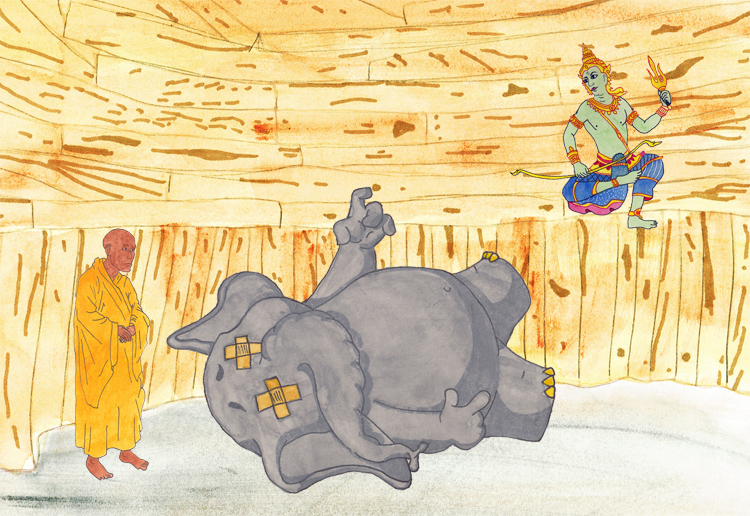
Jataka 410
Somadatta Jātaka
The Elephant Somadatta
as told by Eric Van Horn
originally translated by H.T. Francis and R.A. Neil, Cambridge University
originally edited by Professor Edward Byles Cowell, Cambridge University
This is another story about the futility of mourning for the dead.
“Deep in the wood.” The Master told this story while he was living at Jetavana. It is about a certain old monk. The story was that this monk ordained a novice who took care of him. But soon the novice died of a fatal disease. The old man went about weeping and wailing over his death. Seeing him, the monks began to discuss this in the Dharma Hall. They said, “Sirs, this old monk goes about weeping and wailing over the novice’s death. He must surely have neglected the meditation on death.” The Master arrived, and hearing the subject of their talk, he said, “Monks, this is not the first time this man has wept over someone’s death.” And then he told them this story from the past.
Once upon a time when Brahmadatta was reigning in Benares, the Bodhisatta was reborn as Sakka (lord of the devas). A certain wealthy brahmin who was living in Benares, left the life of a householder and became a mendicant in the Himālaya Mountains. He lived by picking up roots and fruits in the forest.
One day when he was searching for wild fruits, he saw an elephant calf which he took to his hermitage. He treated this calf as if it were his own son. He named the calf “Somadatta,” and he tended it with food of grass and leaves.
The calf grew up to be a great elephant. But one day he ate too much and became sick from over-eating. The mendicant took him inside the hermitage and went out to get medicinal fruits. But before he came back, the young elephant died. Returning with his fruits, the mendicant thought, “On other days my child comes to greet me, but not today. What is the matter with him?” So he lamented and spoke the first stanza:
Deep in the wood he’d meet me. But today
No elephant I see. Where does he stray?
With this lament, he saw the elephant lying at the end of the covered walk. He embraced him around the neck, and then he spoke the second stanza in grief:
‘Tis he that lies in death cut down as a tender shoot is shred.
Low on the ground he lies. Alas, my elephant is dead.
At the instant, Sakka surveyed the world. He saw the mendicant and thought, “This man left his wife and child for the holy life. Now he is grieving the young elephant he called his son. I will encourage him and make him reflect.” And so Sakka went to the hermitage. He hovered in the air and spoke the third stanza:
To sorrow for the dead does ill become
The lone mendicant, freed from ties of home.
Hearing this, the mendicant spoke the fourth stanza:
Should man with beast consort, O Sakka, grief
For a lost playmate finds in tears relief.
Sakka uttered two stanzas, admonishing him:
Such as to weep are fain may still lament the dead,
Weep not, O sage, ’tis vain to weep, the wise have said.
If by our tears we might prevail against the grave,
Thus would we all unite our dearest ones to save.

Figure: The Bodhisatta admonishes the mendicant
Hearing Sakka’s words, the mendicant reflected and took comfort in the Bodhisatta’s word. He dried his tears, and uttered the remaining stanzas in praise of Sakka:
As ghee-fed flame that blazes out amain
Is quenched with water, so he quenched my pain.
With sorrow’s shaft my heart was wounded sore.
He healed my wound and did my life restore.
The barb extracted, full of joy and peace,
At Sakka’s words I from my sorrow cease.
After admonishing the mendicant, Sakka returned to his own place.
The Master, after the lesson, identified the birth: “At that time the young elephant was the novice, the mendicant was the old monk, and I was Sakka.”
